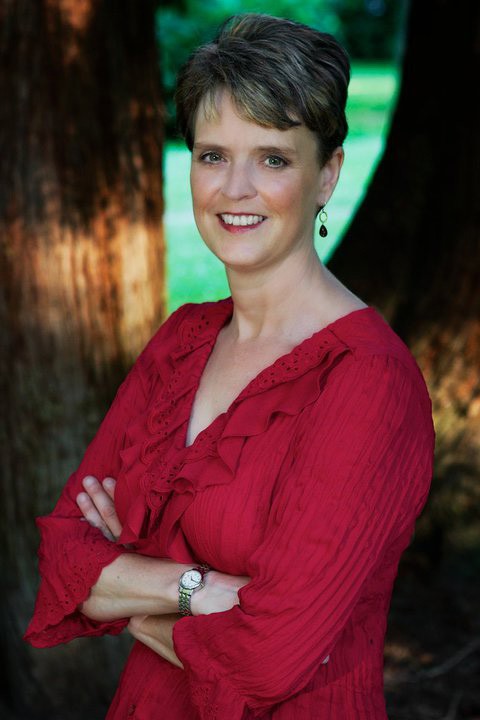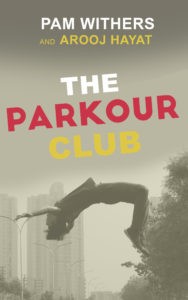 Ebook or print: Amazon.com, Amazon.ca
Ebook or print: Amazon.com, Amazon.ca
WATCH THE Youtube book trailer !
New novel just released by award-winning author Pam Withers, and Arooj Hayat (with help from traceuse Alyssa Serpa — see her photo & the story of her collaboration below)…
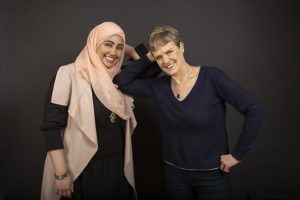
The Inside Story of Writing The Parkour Club
by Pam Withers www.pamwithers.com
This novel was originally inspired by volunteer work I did with Syrian refugees the summer of 2016. My reasoning was simple and naive: Feature a refugee boy trying to adapt to life in an American high school. (We ended up making him a secondary character, and his Caucasian love-interest the main character.)
I knew the lens would be through a parkour club, because a number of readers had been asking me to feature the sport of parkour, a combination of jujitsu, gymnastics and running that enjoys worldwide participation. It’s very popular among youth!
Little did I know what dark twists and turns the seed of the plot would take me from there.
First, I began searching for websites of parkour clubs in the Middle East. I settled on having a protagonist from Yemen when I came across four highly inspiring films of Aden Freerunners in Yemen:
Fearless Freerunners: http://www.barcroft.tv/freerunning-during-civil-war-yemen-aden-abandoned-tanks-bombed-buildings
Rise: https://www.alaraby.co.uk/english/society/2016/3/15/a-leap-of-faith-through-war-adens-freerunners
Loud: https://www.youtube.com/watch?v=HH8a5XI6Tb8
Somewhere: https://www.youtube.com/watch?v=g8L6dIClG8Y
Next, casting about for an antagonist, I uneasily knew I had one after reading In the Skin of a Jihadist: A Young Journalist Enters the ISIS Recruitment Network by Anna Erelle. Yes, recruiters target teens and young people, and it was spookily easy to find their recruiting criteria, literature and much else on the internet.
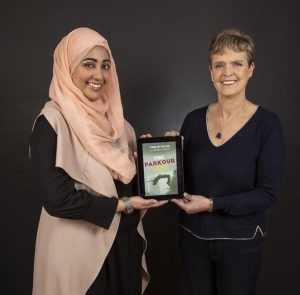
Of course, long before I started outlining or writing, I knew I needed to work with an understanding person from the Muslim community. The BC Muslim Association hooked me up with Arooj Hayat, then a youth leader for her mosque in Burnaby, British Columbia, Canada. We connected immediately, both being extroverts, and had laughs and hugs from the very first session in a coffee shop. I invited Arooj to become my co-author, and she helped write dialogue and brainstorm plot twists, while also ensuring the terminology in the novel was respectful of her faith.
She answered all my questions with true openness, patience, grace and the occasional giggle. Happily for me, she seemed to get a kick out of everything from “decorating” our character Pearl’s room, to supplying Arabic words. Truth be told, Pearl is modeled somewhat after Arooj, and of course Pearl ended up playing a much bigger part in the novel than we previously planned.
When it came time to get a photograph of ourselves as co-authors, Arooj was reluctant to do it because she’d just gotten married, and then pregnant! But what fun we had the day she finally put her toddler in childcare and came to a photographer’s studio to pair up for goofing around in front of the camera. (See more photos at the bottom of this page.)
Also through the BC Muslim Association, I met Imam Shujaath Ali of Vancouver, who was kind enough to answer some challenging questions, later discussed with Arooj.
Meanwhile, Alyssa Serpa – parkour athlete, coach and manager of Origins Parkour and Athletic Facility in Vancouver, Canada – spent hours helping with plot points and parkour move descriptions. She “choreographed” the parkour scenes, especially the climax chase, after being
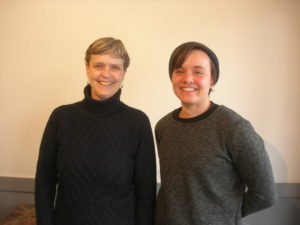
Pam Withers and Alyssa Serpa. A parkour athlete with Origins Parkour in Vancouver, Canada, Alyssa served as a consultant for the novel.
given a framework to work within. What a gift to have her on board!
Of course, the plot would never have worked without some knowledge of how our characters were using and manipulating the internet. That’s where Gail Murphy came in. Despite her super-busy life as professor in the Department of Computer Science at the University of British Columbia, vice president of research at UBC, and co-founder and chief scientist at Tasktop Technologies Inc., she brainstormed that plot aspect, and also involved her teen son, Jason Murphy.
Apologies to residents of Richland, Washington, USA for messing with your geography a little :). Yes, you have a mosque, and a butte that is well above the river. Yes, you have red maple trees. No, that butte doesn’t have a ravine that divides it into twin buttes, and we even had the nerve to make up a high school name. That’s called creative license.
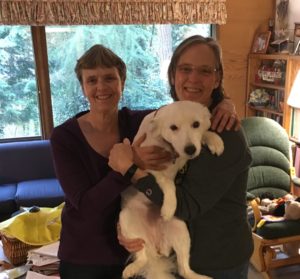
Pam and sister Priscilla in Richland, Washington while Pam was researching The Parkour Club
Special thanks to my sister Priscilla, who hosted me while I was in Richland, Washington. And to editor Allyson Latta, and to our photographer, Larry Scherben of Camera One Photography.
Anita Lau, a teacher of pre-teens in Richmond, B.C., Canada offered to read the manuscript to a group in her school, a reading club with many recent immigrants, some Muslim. She generously shared their feedback with us:
Anita: “Excited to say we started reading your manuscript today. Got permission from the principal and sent home a note to parents. R snuggles right beside me when I read and is very attached to every word. Being a recent immigrant, she really ‘gets’ the story on an emotional level. Today, she broke into tears as she shared how she had to leave a favorite auntie behind. Z and R nod in consensus to the parts about how it’s important to be modest in dress. R shared with us that it’s her dad who decides what she can and cannot wear (skirts, shorts not allowed yet).”
Students:
J: Doesn’t make all Muslims into terrorists like a lot of stuff does.
C: Felt like Karam, the main character, is sitting in the circle with us and telling the story.
D: Makes me want to learn more parkour.
A: Very shady and mysterious.
J: In our religion, the hijab is the girl’s crown. In [my town], at the halal store, people stare at my mom if she’s not covered up, but Mom ignores them. But she wants to wear her hijab to pray in the mosque.
R: (just immigrated to Canada) It was hard to leave my home country, my friends and family. We are lucky to be the few who were chosen to come to Canada. In Canada, I felt better when I met Z and her family because they are from the same place. I felt connected to my culture. We left with four boxes. We had to give up our beautiful home and all the furniture and luxuries.
Z: My mom cried so hard when we had to leave. I was very sad. Social media helps our family keep in touch with people back home.
J: My dad was shot in the leg in Somalia. When he left, there were lots of dangers like pirates in the international waters. But he made it to Canada.
C: My dad and his family had to flee Vietnam and get to international waters. It was dangerous. The government helped the refugees. The boats were 25 meters long and 5 meters wide, packed with 500 people. Lots of people drowned.
J: I felt the tension and the suspense.
L: I can feel the darkness.
R: Did an imam help you with the religious parts? Why did this you choose Islam as the religion for your book?
J: The kids at [Richland] high school are ignorant about Muslims and it really irritates me, being Muslim.
L: [re Richland High girl scenes]: Fun to read; in real life, girls are like that.
And then, the teacher arranged for these students to visit Alyssa’s parkour studio, meet her and me, and try out the sport. (A very popular field trip.)
Another friend of mine, a person of colour and Muslim upbringing who immigrated to England, and then Canada as a child, also read the manuscript and offered me this feedback…
Shahira: Your book is one of the few places anyone has questioned why parents with young children would go to such great lengths to flee a country in which their family has lived for generations, if they were terrorists themselves.
Karam seemed to be welcomed into the Richland High school community quickly and without much resistance. In my experience, there are only one or two students who extend the hand of friendship, while others remain suspicious for some time. It’s tough to be accepted when you’re a different colour, even when you speak English well and don’t come from a Muslim country. Teenagers tend to regurgitate what’s being said around their dinner table about immigrants, and most of it is negative. I like your optimism that Pearl and Karam’s Islamic info session is so well attended. Maybe I’m too cynical, but I would expect very few attendees the first time. Or if many came, I would expect their questions to be more antagonistic.
Pam again: When I got stuck on a plot point one wintery day while visiting my son (a graduate student in Toronto), I asked him if he would brainstorm with me for a few minutes. Jeremy has traveled widely in the Middle East (including Jordan, Israel, Syria, Egypt and Morocco), and we ended up working on the story together for almost two hours. What a generous gift of time and knowledge-sharing that was!
Arooj and I continue to stay in touch (I just sewed her daughter a quilt), and we both hope the book will inspire cross-cultural, cross-religious insight and tolerance. I would like to end by reprinting Arooj’s book dedication, and two quotations we featured in the book:
Arooj Hayat: I dedicate this book to you, the young Muslims, who know the struggle of living as a “visible Muslim” in this society. I know how hard it is growing up with your feet in two worlds, striving to strike a balance, and always having to act like an ambassador for your religion and your culture. And yet, you all keep doing good, smiling, and winning at whatever you choose to take on. Keep it up!
I also wish to dedicate this book to my little daughter, my nieces and nephews, and ALL the children of their generation, growing up in a scary world. May Allah always protect you, strengthen you with moral clarity, conviction, faith, and patience, and make you a shining beacon of hope for a better future, Ameen.
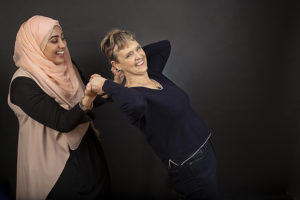
Arooj and Pam doing parkour (not)!
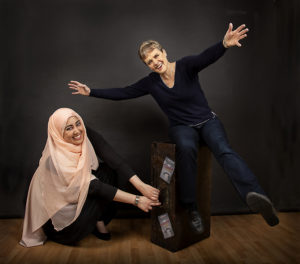
“If you want to make peace, you don’t talk to your friends. You talk to your enemies.”—Moshe Dayan, Israeli military leader, politician and crusader for peace (Newsweek, October 17, 1977)
“When did we start to scare so easily? Why don’t we assume goodwill in one another? Why do we not ask questions of each other, learn from one another?”— Elamin Abdelmahmoud, CBC Opinion, February 28, 2017 (also social media editor, BuzzFeed Canada)

